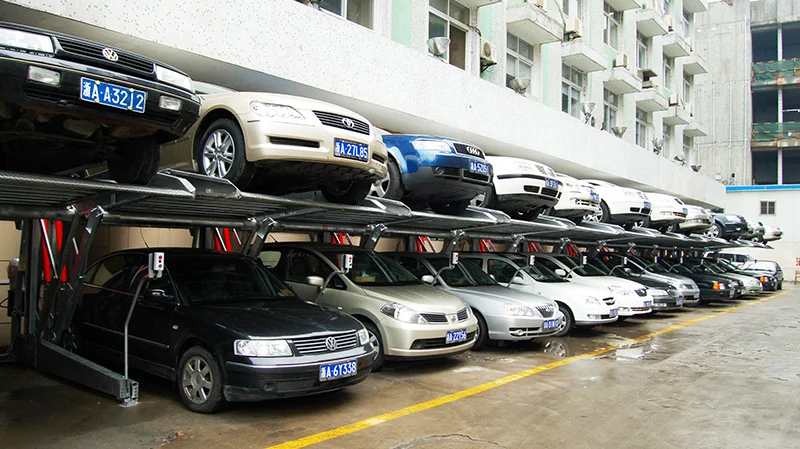The growing urban population, coupled with the surge in vehicle ownership, has placed immense pressure on parking infrastructure worldwide. Limited land availability and soaring real estate costs have made traditional parking solutions less viable, particularly in densely populated cities. The consequences of inefficient parking systems extend beyond mere inconvenience; they lead to wasted time, fuel consumption, increased emissions, and urban congestion. To address these challenges, lifting stack parking systems have emerged as a transformative innovation. By utilizing vertical space instead of sprawling horizontal layouts, these systems optimize parking capacity within a small footprint. Not only do they alleviate parking shortages, but they also align with modern urban planning goals, which emphasize compact, efficient, and sustainable development. This article XIZI iParking explores the advantages of lifting stack parking systems in various settings.
What are Lifting Stack Parking Systems?

Lifting stack parking systems are innovative parking solutions designed to maximize parking capacity by utilizing vertical space. They operate on the principle of stacking vehicles on multiple levels within the same ground footprint, making them a highly efficient and space-saving alternative to traditional parking lots or garages. These systems are engineered to accommodate multiple vehicles by employing mechanical platforms that lift and lower cars using hydraulic or electric-powered mechanisms. At their core, lifting stack parking systems are structured to optimize the use of limited urban land while providing an automated, user-friendly parking experience. Their versatility makes them suitable for various settings, including residential complexes, commercial buildings, public parking facilities, and even hotels.
Advantages of Lifting Stack Parking Systems
1. Maximizing Space Efficiency
Urban spaces are at a premium, particularly in city centers where land costs are exorbitant. Lifting stack parking systems address this issue by dramatically increasing parking capacity within a fixed footprint. For instance, a single stack system can park two or three vehicles in the space of one traditional parking spot. This makes them ideal for locations where horizontal expansion is impossible, such as residential towers, commercial complexes, and public parking lots. By utilizing vertical space, these systems also free up land for other uses, such as green spaces, pedestrian walkways, or additional commercial development. This aligns with the goals of modern urban planning, which prioritizes mixed-use developments and sustainable land use.
2. Cost-Effective Parking Solution
While the upfront cost of installing a lifting stack parking system may seem high, the long-term savings far outweigh the initial investment. For property developers, the reduced land requirement translates into lower real estate costs or the ability to allocate more space to profitable ventures. For example, a developer can use the freed-up land to build additional residential units, retail stores, or office spaces, generating higher returns. Moreover, these systems require minimal operational expenses. The automated design reduces the need for staffing, and the durable construction minimizes maintenance costs. Over time, the cost per parking space becomes significantly lower than that of traditional parking facilities.
3. User Convenience and Time-Saving
Modern consumers value convenience, and lifting stack parking systems deliver on this front. Users can park and retrieve their vehicles with the push of a button or a simple command through a mobile app. The system eliminates the need for drivers to navigate tight spaces or search for available spots, saving valuable time and reducing stress. The retrieval process is also streamlined. Instead of walking through large parking lots or garages, users can simply wait for the system to bring their car to the ground level. For businesses and commercial complexes, this enhanced user experience translates into higher customer satisfaction and loyalty.
4. Enhanced Safety and Security
Traditional parking lots are prone to risks such as vehicle damage, theft, and vandalism. Lifting stack parking systems mitigate these risks by restricting access to parked vehicles. Since cars are stored vertically on automated platforms, unauthorized access is nearly impossible. Additionally, the automated nature of the system minimizes the risk of accidents caused by human error, such as improper parking or collisions. The inclusion of advanced safety features, such as load monitoring, emergency brakes, and obstacle detection sensors, ensures the system operates securely at all times. These measures make lifting stack parking systems one of the safest parking solutions available today.
5. Environmental Benefits
The environmental advantages of lifting stack parking systems are twofold. First, by reducing the land footprint of parking facilities, these systems allow urban planners to incorporate green spaces and other environmentally friendly elements into their designs. Second, the automated operation reduces the time vehicles spend idling while searching for parking, thereby lowering fuel consumption and greenhouse gas emissions. As cities strive to meet their sustainability goals, the adoption of lifting stack parking systems represents a significant step toward greener urban environments.
The lifting stack parking system represents a paradigm shift in urban parking solutions. By combining innovative engineering, space efficiency, and user-friendly automation, these systems address the most pressing challenges of modern cities. Whether for residential, commercial, or public use, lifting stack parking systems offer a sustainable, cost-effective, and highly practical solution. As cities grow and land becomes scarcer, the adoption of these systems will undoubtedly play a critical role in shaping smarter and greener urban environments.
https://www.xizipark.com/How-Lifting-Stack-Parking-Systems-Are-Shaping-Urban-Futures.html
https://www.xizipark.com/PJS-simple-lift.html
www.xizipark.com
HANGZHOU XIZI IPARKING CO., LTD.
About Author
You may also like
-
Top Mistakes to Avoid When Using a Canned Food Labeling Machine
-
How to Select the Right Vacuum Suction Unit for Chemical Applications in Industrial Projects
-
How to Choose an ISO Certified Automotive Starter Manufacturer for Reliable Bulk Supply
-
How to Select the Right Vacuum Suction Unit for Chemical Applications in Industrial Projects
-
What Buyers Should Know Before Ordering Custom FR4 Fiberglass Boards
